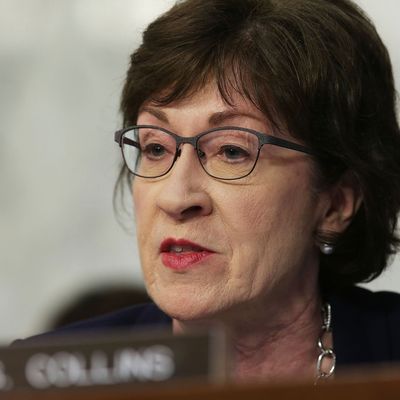
During the worst year of the HIV/AIDS crisis, 43,000 Americans lost their lives to the virus. In 2015, 52,000 died of a drug overdose. Never in recorded history had opioids killed so many Americans in a single year; the drug-induced death toll was so staggering, it helped reduce life expectancy in the United States for the first time since 1993.
The GOP has a talent for ignoring the despair of the dis-empowered. But the opioid epidemic concentrated its suffering in white, rural communities that tend to vote Republican. And so, GOP candidates spent much of 2016 decrying Washington’s insufficient efforts to curb the crisis, and promising to do more to help, if voters would only put them in power.
The pitch worked. Donald Trump won the presidency (in no small part) by outperforming expectations in regions devastated by opioids. Republicans won competitive Senate races in some of the country’s hardest-hit states. And all across America, rural districts hurt by the epidemic returned GOP incumbents to their House seats.
The Republican Party then promptly used its unified control of government to push a health-care bill that cuts one of the nation’s top funding sources for addiction treatment by $834 billion.
Medicaid pays for 44 percent of all addiction treatment in Kentucky; 45 percent in West Virginia; and roughly 50 percent in Ohio. And Obamacare’s Medicaid expansion — which the House health-care bill winds down in 2020 — is responsible for the bulk of that funding in many states. As ABC News reports:
According to data compiled by The Associated Press, Medicaid expansion accounted for 61 percent of total Medicaid spending on substance abuse treatment in Kentucky, 47 percent in West Virginia, 56 percent in Michigan, 59 percent in Maryland, and 31 percent in Rhode Island. In Ohio, the expansion accounted for 43 percent of Medicaid spending in 2016 on behavioral health, a category that includes mental health and substance abuse.
Mitch McConnell is keeping the details of the Senate’s health-care bill shrouded in secrecy. But reports suggest that the upper chamber’s plans for Medicaid differ little from the House’s: The Senate bill may phase out the expansion more gradually — but it will also, reportedly, cut the overall program’s funding even more drastically, beginning in 2025.
Most Republican lawmakers are perfectly comfortable betraying their promises to grieving communities for the sake of financing a capital-gains tax cut for the rich.
But a handful feel a tad squeamish about the whole thing. As the New York Times reports:
Republican senators from states that have been hit hard by the opioid drug crisis have tried to cushion the Medicaid blow with a separate funding stream of $45 billion over 10 years for substance abuse treatment and prevention costs, now covered by the expansion of Medicaid under the Affordable Care Act.
But that, too, is running into opposition from conservatives. They have been tussling over the issue with moderate Republican senators like Rob Portman of Ohio, Shelley Moore Capito of West Virginia and Susan Collins of Maine.
Without some opioid funding, Mr. Portman cannot vote for the bill, he said, adding, “Any replacement is going to have to do something to address this opioid crisis that is gripping our country.”
Rob Portman centered his reelection campaign on the claim that government can — and must — do more to combat the opioid epidemic. Now, he is, ostensibly, comfortable voting for a bill that will free insurers in some states from having to cover addiction treatment; throw millions of low-income people off health insurance; and radically reduce funding for mental health services — so long as the legislation tosses $4.5 billion-a-year at substance abuse treatment programs for one decade.
That isn’t an insignificant sum, but it’s still less than Medicaid currently spends on addiction treatment each year. And given that the Senate bill will throw large numbers of opioid addicts off of Medicaid — and that such people have a wide variety of medical needs, like all other humans — a net-increase in funding for substance abuse treatment wouldn’t fully offset the harm that Trumpcare will do to low-income people afflicted by opioid addiction (let alone, to poor people who suffer from other life-threatening disorders).
All of which is to say, if Senate conservatives “cave” and accept Portman’s proposal, it will be a gesture akin to the House’s last-minute increase in funding for high-risk pools: Once again, Republican “moderates” would be pretending to advance their most vulnerable constituents’ interests by marginally ameliorating a plan to harm them.
What’s more, it’s far from clear that Portman and Co. will even hold out for such a gesture. He and Collins are two of the many Republican senators who have voiced complaints about the hasty, secretive process their party is using to pass its bill. And yet, they could open up that process any time they please. If three members of the Senate GOP vowed to vote against any bill that didn’t go through regular order and committee hearings, Mitch McConnell would have no choice but to heed their demands.
No one can force the Senate’s “moderates” to remain complicit in a process they find contemptible. And no one can force them to vote for a bill that betrays their promises to opioid addicts.
But there’s good reason to think that no one will have to.






























